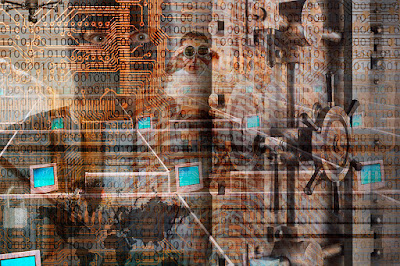As the linked article below indicates the debate about whether we live in a simulation or not continues. It continues to fascinate me because I have lived with feet firmly planted in two worlds: The world of words, metaphor and expression, as well as the world of computers and information processing (I got into the latter because the former lead me to become a student of Marshall McLuhan). Because of this I see things from a perspective that emphasizes the ideas of objectification, the layering of abstractions, and meaning derived by the interactive gap between to objects (read "From Cliche to Archetype" by McLuhan to get a quite interesting take on this). As such for me what we live in is both simulation and not simulation.
Simply put, our vector of energy interaction and translation, from which we associate meaningful objective relationships, starts out with what must be the assumption that we simply can't interpret all of the interactions. There is so much, in fact, that to properly process it all would require a processor reality all its own outside of our 4 dimensional realm. For the practicalities of biological interaction the meaning processor that evolved to be us had to start using filtering shortcuts (see Robert Ornstein's "The Evolution of Consciousness"). We ended up with a brain that makes quick, best guesses on objective interactions going on around us, and that usually works out to our advantage.
In this context, then, what we amalgamate of meaning is a representation of what is actually interacting at many scales of consideration. It is a representation that works so what we miss out on should certainly be contemplated, but not overly fixated on, at least as far as I am concerned.
This notion, however, that all of our reality, even the stuff we don't fully perceive, must be a simulation is ludicrous to me. It may certainly be possible, but the probability of it actually being so is infinitesimally low. I say this because I disagree with most of the main assumptions that are made to argue for the proposition. Let's take them one by one.
First let's talk about simulations in general. It's true that the computational ability to produce visual, auditory and near physical recreations of dynamic, ongoing experience has progressed at an incredibly fast pace. Because of that pace, and related notions that increases in the structure of knowledge leads to ever greater ability to gain more, makes it easy to assume that nothing of a technical matter will stand in our way of either duplicating sentience, or linking created experience directly to existing brain structures. That this might be easy, and/or intuitive, to see does not automatically imply the postulated result.
The fact of the matter is that there is simply so much we still don't know about how synapses and neurons link to what we live as sentient beings that making any kind of "assured" predictions is just foolish in the extreme. Even if we create what we think are sentient copies of our own meaning processor, there will be no truly objective means to verify it; if for no other reason than we will never be able to fully objectively define what we already have as sentience.
The same goes for artificial experience. We can't objectively fully quantify or measure what that is now, not only because of the uncertainty principle, but also because the filtering, and the process of experience association, that actually links meanings to the process of objectifying, as we grow from infant to adult, is so subjective in the first place, and subject to a host of environmental, and cultural factors we may well never be able to fully identify, and model with any absolute precision.
What I have always maintained about virtual reality is this: no matter how high fidelity it might become it will never have everything that actual experience has. Whether you consider what might be missed when you hug or hold a person you care about now, or what might be missed in being in the presence of an actual living mix of other life, you might make the tactility more amplified, or the scents, colors and sounds more vivid, but you would never get everything. Experience will always be experience but one side will also always have something the other does not, and in that we might find another example of how small inputs can have profound effects in truly complex systems. Profound to the point of our folly.
The bottom line here is that to truly understand our place in not only a particular reality, but in the entirety as a whole, we will have to ultimately resort to a philosophical description. And the ultimate guide there will be whether it feels right or not because reason alone won't get us there. This is, as I have stated before, why I have come to rely on a description that puts both mind and the elemental embrace as the fundamental elements of the entirety. From this the creation of meaning processors is an absolute given. At the very beginning of each vector of association the probabilities for the resolution of boundaries are already resolved to make meaning processors possible. It has to be that way not only because there has to be the points of reference that make an "observer in the first place," but also because that very "singular" beginning might itself be the start of sentience at another scale of consideration.

Is our world a simulation? Why some scientists say it's more likely than notA swath of technologists and physicists believe that ‘simulation theory’ will be proved, just as it was proved that the Earth was not the center of the universe
by Olivia Solon in San Francisco
Tuesday 11 October 2016 08.30 EDT






